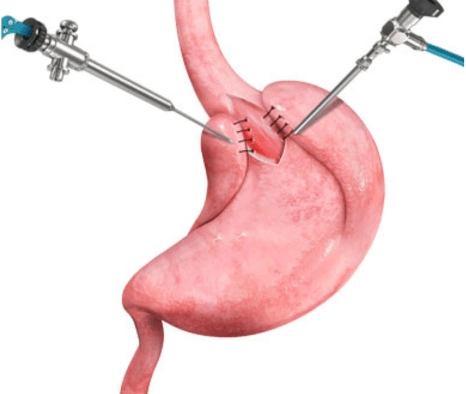Reflux surgery is performe to correct acid reflux. The main goal of the surgery is to eliminate reflux — meaning. That food and stomach acid do not flow back into the esophagus. This helps stop regurgitation (food or acid coming back up) and provides relief to the patient.
In Atlanta, reflux surgery is mainly done for the treatment of GERD (Gastroesophageal Reflux Disease) and hiatal hernia.

This condition occurs when stomach acid or food flows back into. The esophagus (food pipe), causing burning or discomfort in the chest. In rare cases, acid aspiration can allow it to reach the windpipe (airway).
Reflux surgery can be performe in two ways – open surgery or laparoscopic surgery.
Open Procedure:
In this method, a large incision (cut) is made. Removing a part of the stomach is generally not a part of reflux surgery Instead. The most common procedure is Fundoplication, in which the upper part of the stomach is wrappe around. The esophagus to prevent acid from flowing back up.
Laparoscopic Procedure:
In this procedure, the surgeon makes 3–5 small cuts in the abdomen. Through these incisions, a camera and surgical instruments are insert. The surgery is performe under general anesthesia. So the patient does not feel pain during the operation. Compared to open surgery, laparoscopic surgery allows faster recovery and leaves smaller scars.
What are the Benefits of Reflux Surgery?
Elimination of the Symptoms of GERD
Reflux surgery is a procedure that directly treats GERD (Gastroesophageal Reflux Disease). The most common type is fundoplication surgery. Where the upper part of the stomach is wrapped around the lower esophagus to stop acid from flowing back. This helps eliminate symptoms like heartburn, regurgitation, and chest discomfort to a great extent.
Improved Quality of Life
After surgery, patients usually don’t have to rely heavily on medicines (like acid suppressants). With reduced heartburn and reflux. Their overall lifestyle and comfort level improve, and chest or neck pain is also significantly reduced.
Decreased Risk of Barrett’s Esophagus
Long-term GERD can lead to Barrett’s esophagus, a precancerous condition. When reflux is controlled through surgery, the risk of Barrett’s and further complications (such as esophageal cancer) is greatly reduced.
Reduced Dependence on Medication
Patients who undergo reflux surgery often no longer need to take daily medications. Like proton pump inhibitors (PPIs), or their dosage requirements become much lower.
Better Long-Term Relief
Since the digestive system is no longer exposed to unnecessary acid damage after surgery. The risk of ulcers and chronic inflammation also decreases, providing better long-term relief.